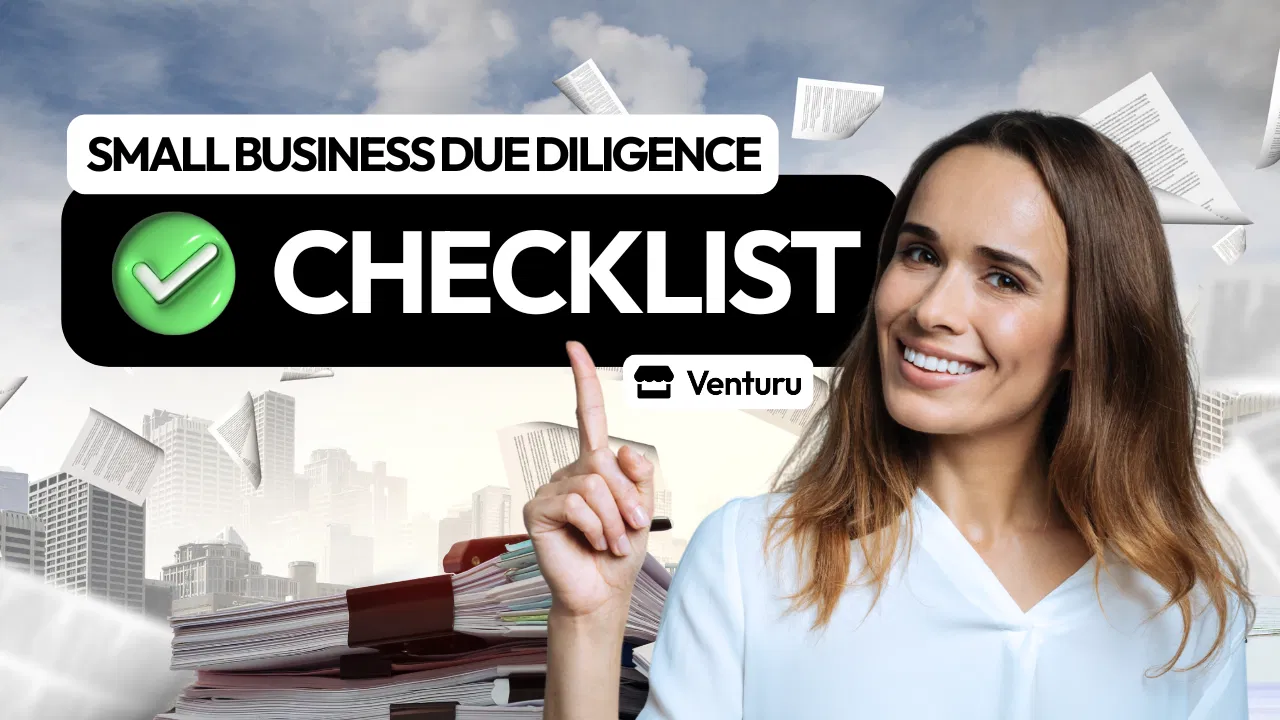Small Business Due Diligence Checklist
A comprehensive checklist for conducting due diligence in small business transactions to avoid potential risks and ensure a successful deal.

Before you shake on any deal, you need to look hard at the business to spot risks, check facts, and make sure it's a good choice. Here's what you should know:
- What to Look At: Money records, law stuff, day-to-day work, place in the market, and tech.
- Why This Is Key: Over 70% of business deals go wrong because of missed problems. Being careful and checking well can stop big, bad surprises.
- Main Steps:
- Look at money health (money in and out, debts, tax stuff).
- Check if it follows the law (gets the right okay from law, no court issues, owns its ideas).
- Check how the business runs (deals, how work is done, who does what).
- Find risks (too much need on one buyer, hidden debts).
Taking 30-90 days to fully check a business can keep you safe from big problems later. Whether you are buying or selling, this careful look helps build trust and keeps your money safe.
Due Diligence Checklist for Buyers
Money Check: Look at the Business's Cash Flow
Knowing how a business is doing with money is like checking its heartbeat - it shows how well it's doing and points out possible dangers. In fact, more than 40% of small business deals find issues with how they keep records [5]. A deep look at the finances can show you if the business is making money, has too much debt, or is covering up big money issues. Next, we'll lay out how to do this in easy steps.
The difference between successful and failed transactions often comes down to rigorous financial due diligence and meticulous preparation. Systematic pre-deal analysis and post-deal integration planning are the key determinants of deal success. - Sidharth Ramsinghaney, Director of Corporate Strategy and Operations at Twilio [4]
Check Money Papers
Start by getting checked balance sheets, money-in, and money-out sheets for the last three years, with five years of talk with auditors [1]. Look for ups or downs in money made and make sure money flow fits money earned. To be sure they are right, look at these against the bank books and tax files [1] [4].
Look at Tax Files
Look at tax papers from the big, small, and local places from the last three years [2]. Watch for things that don’t match between tax files and money papers. Keep an eye on any checks, holds, or quick changes in money that seem off [5] [6].
Find All Debts and What the Business Must Pay
Make a full list of what is owed, like bank debts, credit lines, and gear pay plans. Look over old bills to find late pays [2] [5]. Also, see loan talks for rules that could make one pay it all now [7]. Shops with big debts - mainly those with tight rules or big pay rates - may find it hard to grow or stay up [7].
Checking Laws and Rules
First, make sure the money side is clear. Next, you need to check if everything is legal. Legal problems can stop a business deal fast. The numbers say a lot: 90% of businesses get sued at some point, and small companies face 12 million contract-related cases every year [8]. If you ignore legal stuff, it could cost a lot. Make sure the business follows all laws and has no ongoing legal fights. Start by making sure all the needed papers and permits are right.
Checking Business Papers and Permits
Every business needs the right papers and permits to work by the law. These papers come from places like the local, state, or national government, and they depend on what the business does and where it is. If you don't have them, you could get fined or have to shut down. Also, these permits need to be renewed sometimes to stay good.
Ask for all the current permits and papers and look at when they run out. To find out what papers are needed, talk to your local city office or look at your state’s site. Tools like California's CalGold help find out what permits you need. Remember, even home or online companies must follow the same rules as store-based ones. If you're not sure what you need, ask someone who knows the law well.
Looking for Lawsuits and Legal Issues
Legal trouble is more usual than it seems. Studies say that 36% to 53% of small businesses deal with court cases every year, and 45% of small companies are in legal battles now [8].
Business lawsuits, in general, are nearly an everyday occurrence. They run the gamut from contract disputes to discrimination.
Ask for a full list of all legal fights the business has seen in the last five years. It should show fights over deals, claims of unfair treatment, pay problems, or owning issues. Checking these cases can show how the business deals with conflict and if the same problems come up often. Look closely at fights with buyers and workers, as these often cause legal issues.
In small claims court cases, those being sued win fully 20% of the time, and in another 20%, they end up paying much less than first asked [9]. After looking over these legal issues, check the rights for owning ideas.
Check Idea Ownership Rights
Owning ideas is key for a business. It covers brand marks, invention rights, and rights for creative work that keep the business's name, new ideas, and creative results safe.
- Invention rights keep new inventions safe and last for 20 years from the date they're filed [10].
- Brand marks keep brand names, logos, and sayings safe and can last forever, as long as they're used and fought for [10].
- Rights for creative work cover things like writing, music, and software, lasting for the life of the creator plus 70 years [10].
Type | What It Guards | How Long It Lasts |
|---|---|---|
Trademark | Firm names, logos, and catch phrases | Forever (if kept alive and safe) |
Patent | Brand new ideas, finds, and methods | 20 years from when first filed |
Copyright | Art like books, songs, and apps | Life of maker plus 70 years |
Patents protect inventors and inventions in order to foster innovation. Copyrights protect creative people such as authors and artists from having their works used without their permission in order to foster artistic creation. Trademarks are intended to prevent consumer confusion and protect a company's brand.
- Molly Miller, Manager, Customer Service, Wolters Kluwer [10]
To make sure the business holds all its stated IP, look up patents and marks on the USPTO site. For copyrights, check with the US Copyright Office or do an online search. It's key to see that these rights are real and current. If the business depends a lot on its own ideas, talking to an IP lawyer might be smart for better peace of mind.
Review of Business and Contracts
Once everything is in line with the law, the next move is to look into the business's everyday tasks and contracts. This helps to make sure the business will run well after it's sold. Going through daily tasks can show if the business relies too much on certain people, how strong its systems are, and who owns what.
Check Key Contracts
Contracts are key in a business, showing its duties and what it expects. It’s very important to go through them well to find any hidden risks or promises when buying a business [3]. Start with the ones important for the business’s work:
- Supplier, customer, and landlord contracts: Look for parts that may cause trouble with changes in ownership.
- Distribution, sales, marketing, and supply agreements: Search for limits on where or who can sell.
- Financial agreements: Go over loans, credit lines, mortgages, and security agreements.
- Employee-related contracts: Check employment agreements, noncompete clauses, and nondisclosure agreements for issues after the sale.
With how tricky these papers can be, getting a law expert that knows about buying businesses is smart [3]. Also, ask the seller to promise in writing that there are no hidden issues [1].
Look at Daily Business Operations
Seeing how the business works every day can show possible problems. First, make sure important work tasks are written down. Studies show that only 22% of new businesses in the past decade worked well when growing, even though most value happens when businesses grow [11]. Successful companies have good systems from the start.
Here are main things to see:
- Documented procedures: Make sure there is a clear plan for important tasks.
- Technology: Check the tools and systems used to stay efficient.
- Employee roles: Look at job roles, training, and how tasks are done. Make sure the business doesn't depend too much on one person.
- Insurance: Make sure there is insurance for general issues, workers, and any special needs.
These points give a better view of how the business works and if it can keep doing well after it's sold.
Make Sure of What the Business Owns
It's key to know what the business owns to avoid surprises. Most times when a small business is sold, it includes physical and non-physical things going to the buyer [12]. Start by listing things like vehicles, machines, furniture, and electronics. For things worth a lot, make sure they have clear IDs for checking [12].
Things to keep in mind:
- Leased vs. owned: Things that are leased won’t go with the sale [12].
- Non-physical assets: Check who owns digital things like website names, emails, phone numbers, and social media to avoid mix-ups [12].
- Inventory: Count stock before the deal closes as its value and state can change. Be clear on how to figure out stock costs [13].
Take some time to look over all gear to make sure it's as the seller said and to see if there's any wear or need for fixes. Add the list of items in the buy deal, and have both sides sign it to make a strong legal note of what you are getting [12]. Lastly, double-check that all items are free from debts or other claims to keep from taking on unwanted troubles [12]. This careful check of items makes sure you face no shocks as you wrap up your careful check.
Check for Danger: Spot Issues That Could Lead to Problems
After going through money matters, legal rules, and day-to-day work, the next task is to look for risks that might harm the deal's success. Spotting these areas of concern early can keep you from shock costs after you buy. This step in the careful check-up process aims to find risks that may harm the company's future health.
Look for Money Issues
At times, financial reports that seem okay might have big problems hidden inside. Seeing these warning signs early is key to avoid problems after the deal is done. A big worry is when profit margins go down. If margins shrink often, it might mean costs are up, there is more competition, or there are un-fixed issues [14].
Another red flag is cash flow issues. A company might show profits on paper but have real trouble with cash on hand. This often shows bad cash management [16]. Companies that often use emergency cash or lean on credit for regular costs may have budget or cash issues [15].
Odd accounting moves also hint at trouble. Often changing how accounting is done, slow reports, or changing auditors can suggest transparency problems [14]. Look out for bold moves like overstating income or hiding debts, as these actions can twist how healthy the company really is [14].
Debt is another area to check. If debt grows faster than income or if the debt-to-own money rate is a lot higher than usual, the company may be on shaky ground [17]. A really worrying sign is when the money coverage ratio is below 1.5, meaning the company has trouble paying off its debts [17].
Check Customer and Money Dependence
Relying too much on a few customers is a big risk for any company. If a few buyers make up most of the sales, losing even one could cause big trouble. A company with the top three buyers making more than 50% of sales is at high risk [18].
Douglas Pudney, a business guide and value expert, showed this risk with a true story. A company in the UK relied on two main clients for 70% of its sales. When one client failed, the company hit a crisis, causing a big drop in its value and leading to major changes.
Use the table below to gauge how risky it is to depend too much on a few customers:
HHI Score | Level of Focus | What to Do |
|---|---|---|
Under 1,000 | Low | All is well |
1,000–2,000 | So-so | Keep an eye |
Over 2,000 | High | Act now |
Money needs don't just come from buyers. Leaning too much on one product, way to make money, or place can up risk. Any break in that source can hit fast and hard. Firms with varied money ways are mostly more steady and can face tough times better.
List Unresolved Problems
Unsolved legal and rule-following problems can suck value and bring on costs you didn't see coming after you buy. Studies say buyers often use 10-30% of the buy cost to fix legal issues found after the deal. It's key to spot these problems early.
Lawsuits with buyers, workers, or partners are big risks that need quick focus. Rule breaks - be it safety, work laws, or field-specific rules - can lead to fines, limits on work, or must-do fixes. Fights over brand marks, patents, or author rights put doubt on rights to use main things.
Tax checks or debts are a warning sign, as they might show tax rules not followed that could bring big money trouble. Keep in mind, unsolved issues usually fall to the new owner.
To handle these risks well, make a full list of all spotted issues. For each, guess the money impact and the time needed to fix it. This will guide if you should go on with the deal, talk for a lower cost, or ask the seller to fix stuff before closing. Some risks can be handled with good planning, but some might be too big, making the buy a bad idea.
Write down all you find in this risk check. A clear record of possible problems not only keeps you safe in law but also helps you choose wisely if the chance is worth the risks.
Conclusion: Follow This List for a Safe Deal
When you do your due diligence, you gain clear thoughts and sureness to make smart choices while buying or selling a small business. This list points to main things to look at: money records, sticking to the law, how things run, and possible risks. Each part helps you fully understand the business before you agree to it.
Due diligence is your opportunity to thoroughly examine the company and verify that all the information the seller presents about it is correct. - Quiet Light [19]
Usually, it lasts between 45 and 60 days. Don't rush - missing small things can cost a lot. Check the legal and work parts, and get help from pros like accountants, lawyers, and business experts. They know things you might not and can guide you through hard parts.
Keep all checked papers in good order and store them safe, best in a digital place. Being ready makes things go better.
Simply put, conducting sell-side due diligence ensures that your business is ready for a sale, even if you receive an offer out of the blue. - Kison Patel, CEO and Founder of DealRoom [20]
Keep in mind, every part of the list is linked - the law can change money matters, and work troubles can hurt how customers see us. This full view helps you see the whole business more clearly.
As you dive deeper, update your list to show new facts or changes in the field [21]. Rules shift, new dangers pop up, and no two deals are alike. Being able to change is key.
The main aim is to know what you're getting and make sure the price fits its real worth. Some problems may be fixed, while others could mean it's time to step back. This list helps you tell which is which, giving you power to talk strong.
Though the list guides you, it can't replace good thinking. Trust how you feel - if something’s wrong, don't push on. The right chance will show up, and then, you can make a smart deal.



